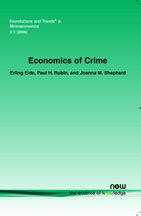Economics of Crime
By Erling Eide, Faculty of Law, University of Oslo, Norway | Paul H. Rubin, Department of Economics, Emory University, USA | Joanna M. Shepherd, School of Law Emory University, USA
Abstract
This paper starts with a review the economics of criminal behavior. Then, the authors discuss the theory of public enforcement. The economic analysis of criminal behavior and criminal law has been a hugely successful enterprise. As an academic enterprise, it has achieved the goal of research—it has generated a large and growing literature. More important than academic success, however, has been the influence of this branch of learning on actual practice. The understanding of deterrence effects and rational responses by criminals has substantially changed the purpose and functioning of the criminal justice system.
Economics of Crime
Economics of Crime presents the basic model of criminal behavior and law enforcement. The authors start by reviewing the economics of criminal behavior. Models of criminal behavior applying the model of individual rational behavior are presented. Empirical studies surveyed use regression analyses and employ data from states and police regions down to individuals. These studies tend to support the hypothesis that the probability of punishment and the severity of punishment have a deterrent effect on crime. Methodological problems relating to the assumption of rationality, statistical identification of equations, measurement errors, and operationalization of theoretical variables are discussed. Economics of Crime also review the theory of public enforcement including probability and severity, fines and imprisonment, repeat offenders, incentives of enforcers, enforcement costs and enforcement errors. Economics of Crime is intended for economists and lawyers, practitioners, scholars and students in the field of law and economics, microeconomics, and criminology who wish to learn the basics of the economics of crime, criminal behavior, and law enforcement.
